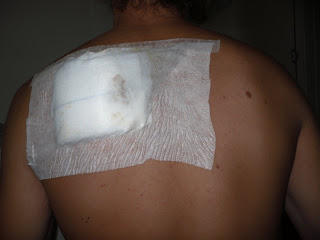I have been in the PC infirmary for three weeks now and will be here for one more before the PC doctors let me leave. I am fine, but I had to have surgery and have to have the big hole in my back taken care of twice daily by the friendly nurses at Suva Private Hospital until it heals enough.


My room is a white box with a twin bed, chair, electric kettle and a tv that picks up two stations - Al Jazeera and FijiOne (Fiji's local station that airs dubbed Korean soap operas).

I try to get work done while here. I meet with Government agencies - Ministry of Environment, Land and Water Resource Division, Department of Tourism - to get assistance with projects. But for the most part I'm useless because the real, meaningful work is done in the village, working with the villagers. I just can't wait to go back.
But I fill my time and try to enjoy myself as best as I can. I swim, go for walks, meet friends for happy hour drinks.
Suva is a really nice city for being a major international port. Its got about 80,000 people of very mixed ethnic backgrounds; predominately Fijian and Indo-Fijian, but heavy influences of Polynesians, Asians (Chinese and Korean), and European descent (Austrailian and New Zealand, with some British and American expats.) This stew creates a lot of good looking people. Very pretty women. USP, the largest University in the South Pacific, is here, and so are plenty of jobs (relatively speaking) so the area attracts a lot of young people who flee the villages in droves in hopes of adapting the western way of living they see on the picture screens. So its a young vibrant city that is a paradox to the village life - its difficult to shuffle back and forth between the two. I'm really looking forward to getting back to the village and staying there.





